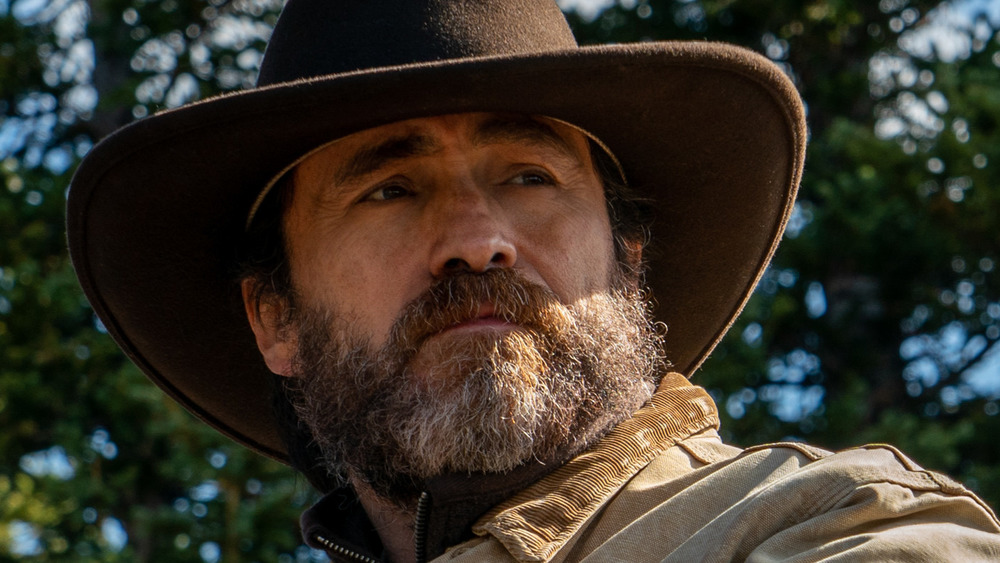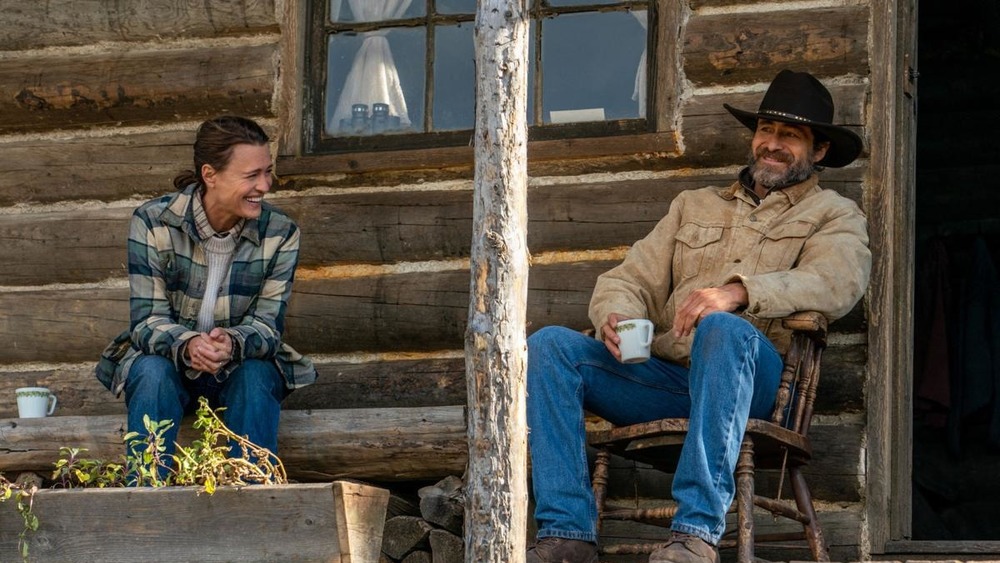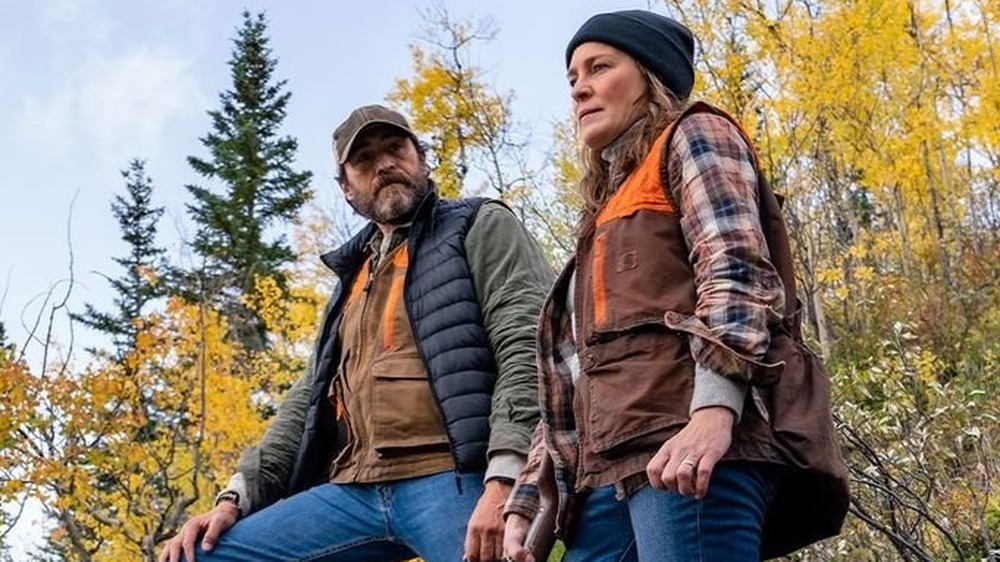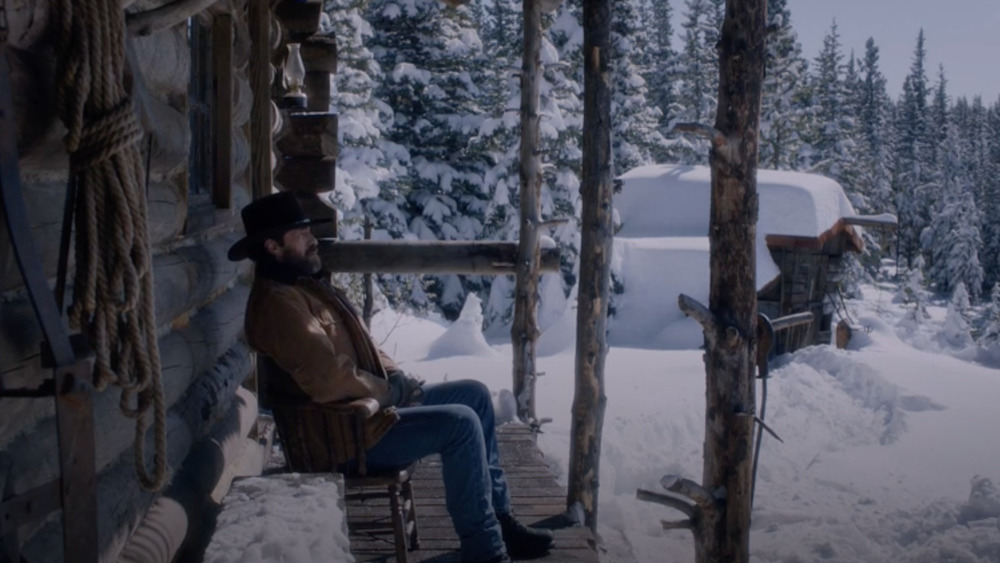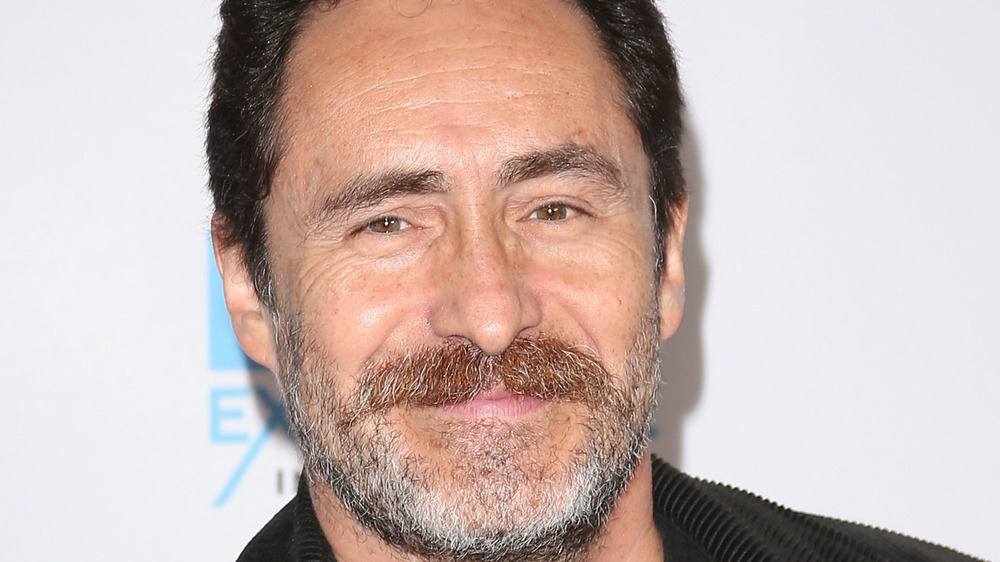Demian Bichir On Making Land With Robin Wright And Why He's A Kong Man - Exclusive Interview
Demián Bichir's long and prolific acting career has seen him wear a variety of hats under the direction of some very big-name filmmakers. From getting horribly murdered on distant worlds in Ridley Scott's Alien: Covenant to portraying a historical linchpin like Fidel Castro in Steven Soderbergh's Che to getting down and dirty with Quentin Tarantino's The Hateful Eight, Bichir has been around the cinematic horn, and plied his trade in films big and bombastic as well as quiet and intimate.
His latest effort, Land, definitely falls under the latter tent. The feature film directorial debut of actor Robin Wright, Land tells the story of a woman whose quest for solitude in wake of personal tragedy leads her to a life in the wilderness and to a near-death, before she's saved by the intervention of Bichir's quiet, kind Miguel. A dialogue-light but emotion-heavy role, Miguel showcases Bichir's ability to hold his place in a scene with nothing more than a simple gesture, and plays him off memorably against Wright's troubled Edee.
On the eve of Land's release, we had the chance to sit down with Bichir to discuss what Wright was like behind the camera, what it was like filming in the hands of Mother Nature, and his upcoming project, the just-slightly-more-over-the-top Godzilla vs. Kong.
How Robin Wright took control on the set of Land
You've worked with some pretty big-name directors, and here, you were working with a director who, while she's been around, this is her first feature film. How would you characterize Robin Wright as a filmmaker?
Yes. I have been very, very lucky to work with some real heavyweights and fantastic directors, but you know, what Robin Wright has in common with Chris Weitz, and Steven Soderbergh, and Ridley Scott, and Tarantino, and now George Clooney is that many of them actor/directors as well. Chris Weitz, Tarantino, and George Clooney, they all know exactly what they want. And so does Robin. And when you take a look at the choices she's made as an actor, then you know that she will make equally great choices as a director. She's a very smart artist, and you need that if you want to command a 150-person ship, you know what I mean?
And one of the most beautiful things to witness when we did this was how clear everything was for her, and how easy she took the whole thing. You never saw her panic, and it's literally as if she had done it forever. And that's not an easy thing. It's not an easy thing. Because when you're a new director, all the eyes are on you, and you become like a little thing in a microscope, and everyone is just watching and measuring, and you're under big scrutiny. And also, this first-time director is also one of the best actors of her generation, right? Then, the eye becomes even tougher on her. And if you think about the fact that there are not too many female directors... we all need more, because they have a better eye. period. They see life better in general, let alone art.
All of those elements could play against anyone in her place. That could have placed a big pressure on her. You never saw that. You never saw that. You need a good leader to command this operation, and she did it with grace, and kindness, and generosity.
Demian Bichir on Miguel's humanity in Land
Every actor brings some of themselves to each role they play, but what were the parts of Miguel that spoke to who you were, and that you identified with, as you got into developing this role?
You know, what I've heard from everybody who has seen the film, is that it's very easy to identify ourselves in it, because what we show in these two characters, Edee and Miguel, is pretty much how we are as human beings. We all go through a hard time... or if you haven't, you will. That's a must. That's the only thing that is secure in this life: That we will, at some point, lose a loved one, whether it's in an early stage or later on in your life, whether you expect it or not. That alone makes us connect very easily with the story, and with the characters.
To me, it was about the very unique type of human being that Miguel is. I'm not saying that I have his virtues, or that I'm equal to this human being who's willing to put everything aside in order to help another human being that he doesn't even know. How many people do that, you know what I mean? The key part is when he says, "You were in my path. That's exactly why I helped you." Right? When she asks, "Why do you help me?" How many of us really stop when something is in your path, and when you have that opportunity to change somebody else's life? Very few of us.
So that, to me, was a key part of all this. In the times we're living, I think it's about time that we remember who we are as human beings. And this is the best of us, and it's in the arts, and it's in science. And it's, of course, in athletes around the world, that's the best of us. And you see that in these characters. And when you don't care what your background is, and where you're coming from, in order to make a difference in somebody else's life, that's, to me, when we will step out of our own bubble and become humans for good.
So, it's so timely, especially nowadays. I saw that there, and I identify myself very easily. And I wanted to explore that, and I wanted to explore the fact that this character is so contained, and so frugal in words, emotions, actions, and all that. I wanted to go into that territory that I hadn't explored before.
He says a lot without verbally saying a lot throughout the film. Did you find that a challenge as an actor to deliver?
Yeah. Yeah, absolutely. I saw that in the script, and that's pretty much what excited me about it. I thought, "Ah, this is going to be great." I love football. I still go and kick balls sometimes. And this is very exciting when you have a difficult game ahead of you, when you have to face a big challenge. There's some excitement about it that you never chicken out of it. You just go for it. It's like facing nature, just the same way we did when we shot this film.
Land brought Demian Bichir back to nature
That actually leads to the next question, because it very much seems like the environment is almost a character in the movie in itself. Reading the production notes, you guys were out there, you were on a mountain, and you were doing all this in the teeth of the elements. What was that experience like for you?
It was beautiful, man. It was beautiful. It has confirmed that nature heals. Nature changes your heart, and your mind, and many things, and I think that's probably why millions of people around the world give themselves that chance, to either go for a walk, like hiking, in any hill or mountain around wherever they live, or going to the ocean, and just staying there. Just stare at it. Just lay down on the floor and look up. Take a look at the stars sometimes, you know what I mean? Take a look at the way the clouds dance. When we do that, we come back and ground the original idea that makes us human. Why are we here, you know what I mean? We are so immersed in our own craziness, and going so fast and in a fast track all the time, in the fast lane all the time, and we never stop to understand that we have created all this in order to try to make some sense.
But basically, this is about us connecting with nature, and nature, be it a mountain or an animal, is to me a key element in this story. Nature dictated the way we shot this film. You don't see that very often. You usually have a shooting plan that is created during pre-production, right? In this case, it was nature, and Mother Nature, she was so moody, and she was sometimes furious, and sometimes very kind and beautiful. I'm always amazed by that, the way that nature manifests herself, the way she shows her different states of mind. I find that fascinating, that strength, that power.
So we had to play along with that. Sometimes, if it was raining, then let's get ready for that. If it was beautiful and sunny, let's go get ready for that. Then four feet of snow, wow. It was great. It was fantastic yesterday. We have this snow, let's go for the snow scenes. So we danced with nature as well. That was a beautiful thing, man. I mean, that's, I guess, the beauty of independent films, the beauty of low-budget films, because that's pretty much the way films are made around the world. Very few countries have the power to put $25 million in a film. You know, that's crazy. We may feel it was very little money, but this is the way we did it here, and that it gives you a lot of different freedoms.
Demian Bichir on going to cinematic extremes and why he's a Kong man
That draws an interesting contrast, because the other big movie you have coming out this year is Godzilla vs. Kong. This is a very quiet, intimate film, that's a big CGI spectacle. Can you talk a bit about making that movie?
I can even go further than that, because I compare cinematographies, also. I compare different industries in different countries. The beauty of speaking two languages is that I can do it in Spanish and English, right? So, I've shot in Spain, Bolivia, Colombia, Argentina, Ireland, Australia, England, and France. Everywhere you go, the things we do making a film are exactly the same. The only thing that changes is, of course, how much money you have to make it, because that will determine how much time you have, and probably how great the craft service will be.
But we adapt. We adapt to that. What I look for, every time I have a chance to explore a new project, is the chance to go to extremes. I love that I've been having these chances to go into different genres, and different budgets, and different everything. Just lately, over the last two years, between Robin Wright's film and George Clooney's The Midnight Sky, I shot a very ultra-low budget film; the lowest budget I've ever made a film under, in Mexico. It's a Mexican film called Danyka, with Michael Rowe, who's an Australian living in Mexico.
We shot that in Sinaloa by the Sea of Cortez. So I was jumping from those mountains into the Sea of Cortez in Sinaloa, and into this ultra-major production of The Midnight Sky. I had come back a year before from doing Godzilla vs. Kong. I think that's beautiful. I feel very lucky that I have that chance to fluctuate into many different territories, and live to tell the story, if you know what I mean, and not die trying. I think it's great. You adapt to many different circumstances.
Without giving anything away from Godzilla vs. Kong, who would you pick to win in that fight, and why?
I'm a Kong man, man. I'm a Kong man. To me, King Kong... although they're both difficult to believe that they exist, Kong is a lot more like me, you know what I mean? I identify with that guy, because he is more like us humans. He is very sensitive. He's raw and fantastic. The work they do in that film... I mean, in all the films, from the film that Naomi Watts did, remember a few years back? That's where we saw this beautiful thing for the first time, really, that it was so real. What they do nowadays with technology, my goodness. It's overwhelming. I saw the film and it felt like, "This cannot be happening. This is the real thing." It's very impressive to watch. But I think Kong would rule, yeah, over Godzilla.
